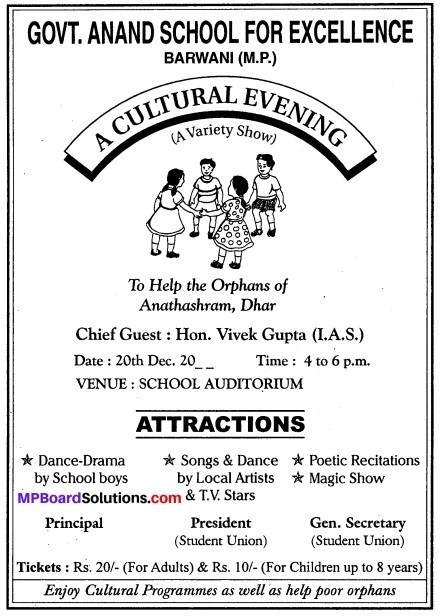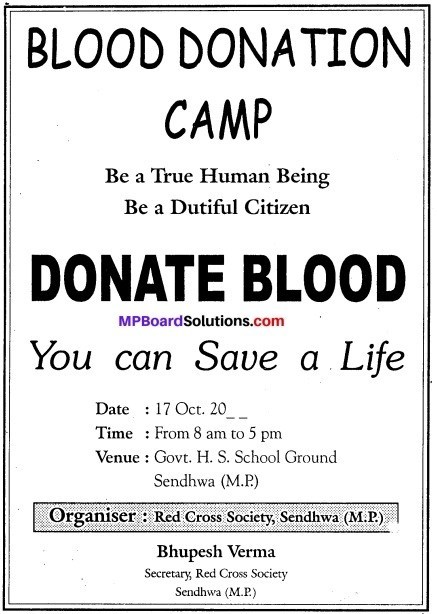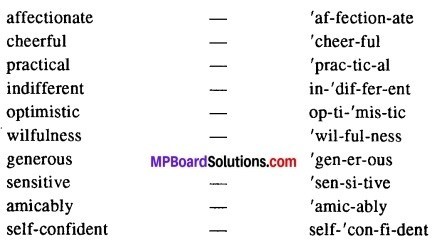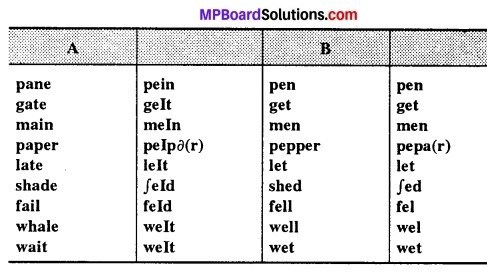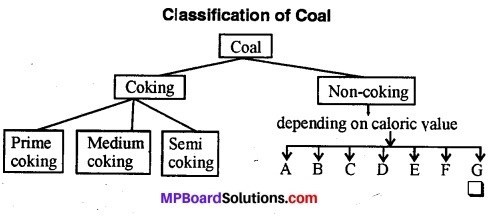MP Board Solutions for 12th English The Spectrum Workbook Solutions Chapter 6 The Face on the Wall Questions and Answers aids you to prepare all the topics in it effectively. You need not worry about the accuracy of the Madhya Pradesh Board Solutions for 12th English as they are given adhering to the latest exam pattern and syllabus guidelines.
You Can Download MP Board Class 12th English Solutions Questions and Answers Notes, Summary, Lessons: Pronunciation, Translation, Word Meanings, Textual Exercises. Enhance your subject knowledge by preparing from the Chapterwise MP Board Solutions for 12th English and clarify your doubts on the corresponding topics.
MP Board Class 12th English The Spectrum Workbook Solutions Chapter 6 The Face on the Wall
Kick start your preparation by using our online resource MP Board Solutions for 12th English Chapter 6 The Face on the Wall Questions and Answers. You can even download the Madhya Pradesh Board Class 12th English Solutions Questions and Answers for free of cost through the direct links available on our page. Clear your queries and understand the concept behind them in a simple manner. Simply tap on the concept you wish to prepare in the chapter and go through it.
Word Power
A. Consult a dictionary to And out the full forms of the following abbreviations :
Answer:
- A.I.D.S.—Acquired immuno deficiency syndrome
- P.M.—Prime Minister
- M.P.—Member of Parliament
- etc.—(etcetra) and the same
- i.e.—(id est) that is
- e.g.—(exempli gratia) for example
- P.T.O.—Please Turn Over
- N.B.—(Note Bena) Please note
B. Choose the correct spelling (British English). Consult a standard dictionary.
Answer:
- medieval
- hygienic
- illogical
- etiquette
- aesthetic.
- condescend
- elegant
- trivialities.
Comprehension
A. Read the story carefully. Each of the places in the left column is related to an event in the right column. Match the columns.
Place – Event
1. between Spezzia to Pisa – (a) the narrator saw the man in a taxi
2. Boulogne – (b) the man boarded a train
3. Charing Cross – (c) the man embarked a boat
4. Folkstone – (d) the narrator disembarked from the boat
5. Great Ormond Street – (e) the address on the card stated
6. Piccadilly – (f) the millionaire had a car accident
7. Pittsburg – (g) the narrator lived
Answer:
1 – (f), 2.- (d), 3.- (b), 4.- (c), 5.- (g), 6.- (a), 7.- (e).
B. Each of the persons in the left column is related to an activity in the right column.
Match the columns :
Person- Activity
1. Dabney – (a) reminded the narrator to tell the thirdjAing
2. Ormond Wall – (b) had brought the little man with an anxious white face
3. Rudson-Wayte – (c) owned the place where the talk was going on
4. Spanton – (d) died in a car accident
Answer:
1. – (c), 2.- (d), 3.- (b), 4.- (a).
Language Practice
A. Answer the following questions and arrange your answers in the form of a paragraph.
(i) When do you get up in the morning ?
Answer:
I get up in the morning at 6 O’clock.
(ii) What time do you eat breakfast every morning ?
Answer:
I take breakfast at 8 am.
(iii) What time do you go to school ?
Answer:
I go to school at 10 am.
(iv) What time do you begin work ?
Answer:
I begin work at 10.30 am.
(v) What time do you have lunch ?
Answer:
I have lunch at 1.30 pm.
(vi) What time do you finish your work ?
Answer:
I finish my work at 5 pm.
(vii) What time do you come home every evening ?
Answer:
I come home at 5.30 pm.
(viii) What time do you have dinner ?
Answer:
I have dinner at 7.30 pm.
(ix) How much time do you devote to computer ?
Answer:
I devote 2 hours to computer.
(x) What time do you go to bed ?
Answer:
I go to bed at 10.30 pm.
Paragraph form—I usually get up in the morning at about 6 O’clock. After taking and reading the morning newspaper I take breakfast at 8 am. Then I study and do my home work. I go to school at 10 am and reach there at 10.30. Lunch time is 1.30 to 2 pm. At 5 pm my periods are over. Then I come back home at 5.30 pm. After watching some T.V. programmes or playing, I take my dinner at 7.30 pm. Then I sit down at the computer table for two hours. Then I study again and do my home work. I go to bed at about 10.30 pm.
B. Finish the paragraph given in the book using the simple present tense. Here is some more information for you to include :
(i) the journey/take/two hours
(ii) coffee/tea/serve/passengers in the air
(ii) a bus/meet/aeroplane/at the airport.
(iv) the bus/take/the passengers into Delhi
(v) a return ticket/cost/Rs. 5000/-
Answer:
Every day, a Boeing leaves Hyderabad for Delhi. It leaves Hyderabad at 20.05. The journey takes two hours. Coffee/tea is served to the passengers in the air. A bus meets the aeroplane at the airport. The bus takes the passengers into Delhi. A return ticket costs Rs. 5000/-
C. Complete the sentences by putting the verbs in brackets into the simple present or the present continuous tense.
1. My mother normally …… at home, but she …… this month in Simla. She …… in a summer school there, (work, spend, teach)
2. A: Look, it again. B : Yes, it most days at this time of year. (rain)
3. Goodnight, I …… to bed. I always to bed early during the week, (go)
4. Most days, John to work, but since it …… today he …… his car to work. So Mary her shopping at the local shop instead of the supermarket where she usually (cycle, rain, take, do, go)
5. A : Where are the children ? B : They …… in the garden. They …… home from school at about four and usually…… straight out to play with their friends, (play, get, go)
6. A : What work …… ? B : He …… French and German; but he English as well, (your Father do) (teach)
7. We usually …… the news on TV at seven O’ clock, but tonight we, …… that new soap opera, (watch)
Answer:
- works, is spending, is teaching
- is raining, rains
- am going, go
- cycles, is raining, is taking, does
- are’ playing, go, get
- i does your father do; teaches, teaches
- watch, are watching.
D. Put verbs in the correct tense and insert “since” or “for”.
Question 1.
I (write) ten letters …… breakfast.
Answer:
I have written ten letters since breakfast.
Question 2.
I (not see) him …… more than a week.
Answer:
I have not seen him for more than a week.
Question 3.
“How long you (wait) ?” It …… half an hour.
Answer:
How long have you been waiting ? It is since half an hour.
Question 4.
That boy (not wash) his face …… some time.
Answer:
That boy has not washed his face for some time.
Question 5.
They (build) that bridge …… several months, but they (not finish) it yet.
Answer:
They have been building that bridge for several months, but they have not finished it yet.
Reading Time
Read the following passage carefully :
While out driving with my children one day, I noticed a woman statuling beside her car. I pulled up behind her and discovered that not only was a tyre flat, but she wasn ’t sure how to change it. / offered to fix it, and we were soon both on our way.
After a few hours, I decided to head home when I noticed steam rising from my bonnet. I pulled into a restaurant car park and found a hole in the radiator. A truck had just driven in, and driver asked me what the problem was, I explained, adding that my brother, Brad, was a mechanic and that I’d call him. When he found out Brad lived an hour away, he took my kids into the restaurant and brought them supper, refusing payment. Then he took us to his relative’s house nearby.
Not only did the man wait for Brad to arrive, but they drove off together to have a look at the car. After it was fixed, I thanked the man for his overwhelming generosity. “It’s no trouble,” he said. ‘7 happened to be ‘ driving down the highway a few hours ago and saw you helping a lady with her car troubles. What goes around comes around.”
Now answer the questions given below :
Question 1.
Find out the phrasal verbs from the passage which convey following meanings :
Answer:
- to stop—pulled up
- to enter a station and stop—pulled into
- to get some information—found out
- to leave—on our way
- to drive quickly—drove off
Question 2.
Where did the author stop ? And what did he observe there ?
Answer:
He stopped near the car of a woman. There he observed that not only was a tyre flat but she wasn’t sure how to change it.
Question 3.
What did the author see in his bonnet ?
Answer:
He noticed steam rising from his bonnet. Later he found a hole in the radiator.
Question 4.
Who took the kids into the restaurant ? (2013)
Answer:
The truck driver took the kids into the restaurant.
Question 5.
Who went to have a look at the car ?
Answer:
The truck driver and author’s brother Brad went to have a look at the car.
Question 6.
What did the truck driver say after checking the car ? (2014)
Answer:
The truck driver asked him what the problem was.
Question 7.
What do you understand by “what goes around comes around ?”
Answer:
We understand that he who helps other gets help in return.
Question 8.
Why did the author thank the truck driver ?
Answer:
The driver took his kids to a restaurant, brought them supper, refusing payment. He also took them to his relative’s house nearby and also went to the car with his brother. The author thanked him for his overwhelming generosity.
Question 9.
Give a suitable title to the passage.
Answer:
As you sow so shall you reap.
Writing Time
Question 1.
Write a paragraph in about 80 words on ‘Role of Computers in every day life.
Answer:
Now-a-days computers have become popular in many fields. They have become part and parcel of our lives. Computers are being used in banks, offices, factories, and shops. It has become our daily necessity. We can call our age the computer age.
We can learn many things on internet. Video games are popular with children. Through the computer we can send our letters and other communication through e-mail. In printing books and other material it is very useful. We can say computers have become very essential now-a-days.
Question 2.
Write a paragraph on ‘Importance of trees’ in 80 words.
Answer:
Trees are very important for us. They give us fruits to eat and firewood to bum. We build houses and make furniture with their wood. Trees support the life of living beings. They give us oxygen to breathe. They absorb the carbon dioxide which we exhale. They produce starch for our food. Trees cause rainfall. Hot days are cooled by trees. They check the surface soil of the earth from being washed away by rains. Trees also help to prevent sudden floods.
We believe the information shared regarding MP Board Solutions for 12th English Chapter 6 The Face on the Wall Questions and Answers as far as our knowledge is concerned is true and reliable. In case of any queries or suggestions do leave us your feedback and our team will guide you at the soonest possibility. Bookmark our site to avail latest updates on several state board Solutions at your fingertips.
